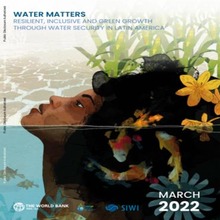What Is Water Security?
Water security is much more than physical resource scarcity. As defined by Grey and Sadoff (2007), it is “the availability of an acceptable quantity and quality of water for health, livelihoods, ecosystems and production, coupled with an acceptable level of water-related risks to people, environments and economies.”
In this way, water security focuses on the positive and negative outcomes—and not processes—for people, the economy, and the environment that are influenced by diverse aspects of water management. Social outcomes may include people affected by water-related disasters, children affected by water-borne diseases, conflicts around water supply access, or water-based recreation. Economic outcomes may include economic losses from floods and droughts, hydropower production, or the value of irrigated agriculture. Environmental outcomes may include ecosystem health, extent of wetlands and estuaries, freshwater quality, or aquatic biodiversity.
Water insecurity slows growth and impedes development and human welfare. It causes global economic losses in different aspects including property damage from floods, food losses from droughts and water scarcity. Ecosystem degradation and pollution damage, although hard to quantify, poses significant threat to future water provision, especially in the context of climate change.
Water insecurity is typically driven by a combination of environmental, societal, technological, and governance factors. The most water insecure countries combine challenging hydrological environments with weak institutions and chronic under-investment in water infrastructure. Even when water is abundant and the hydrologic regime is benign, mismanagement (for example, misallocation or poor pollution regulation) or inadequate infrastructure investment can lead to water insecurity. As such, water security cannot be adequately assessed by any single integrative index. In addition, water security often intersects with other security issues, including energy security, food security, climate change and with national security.














